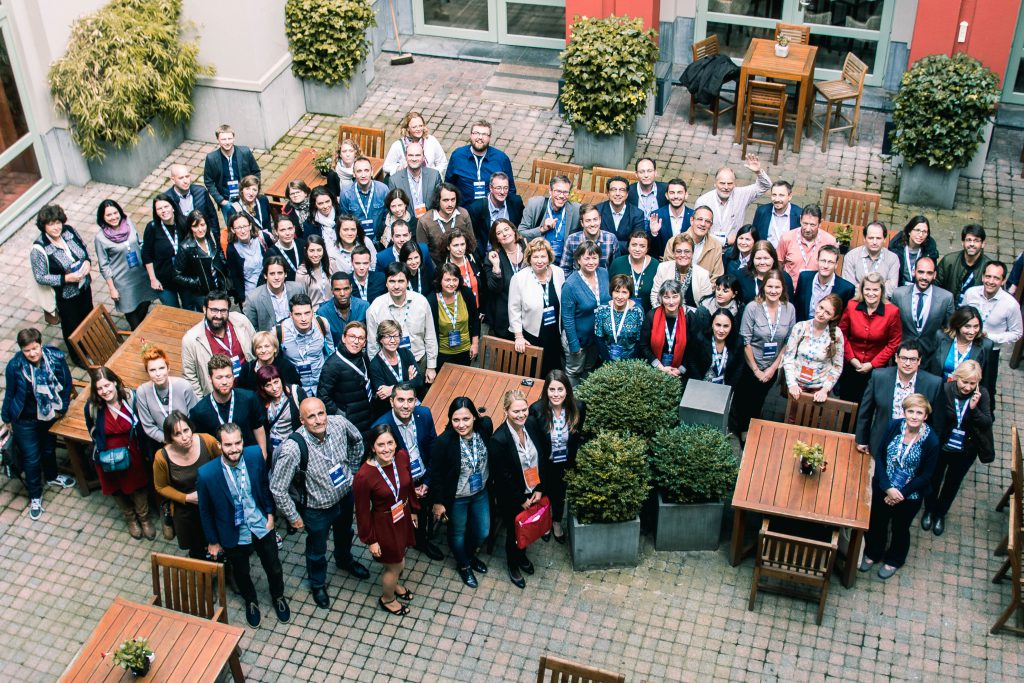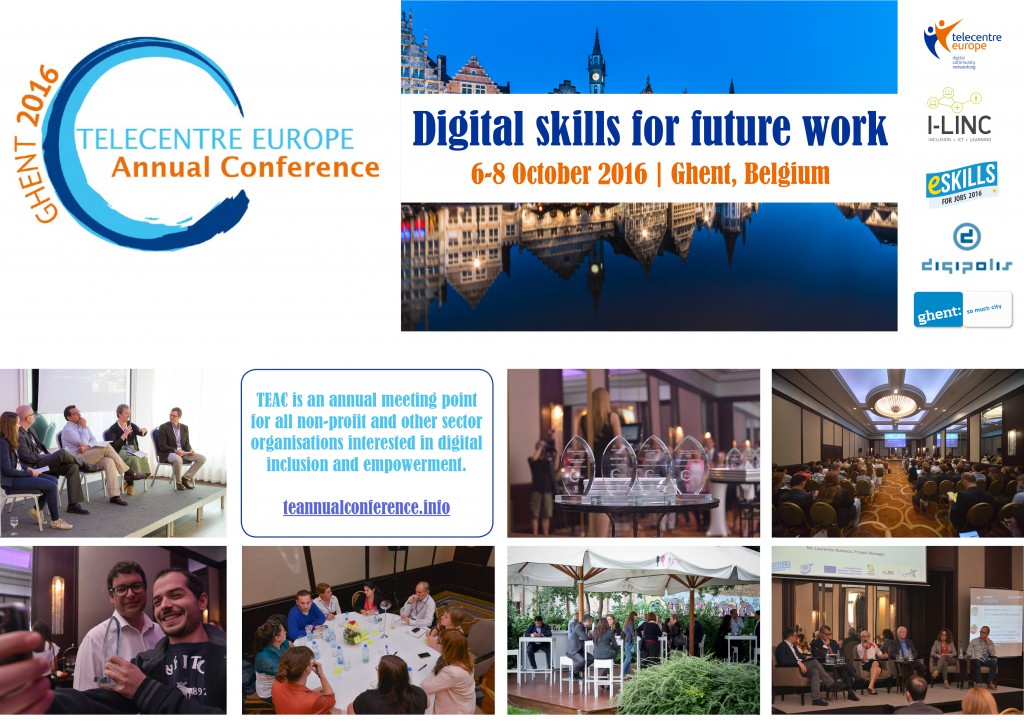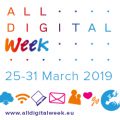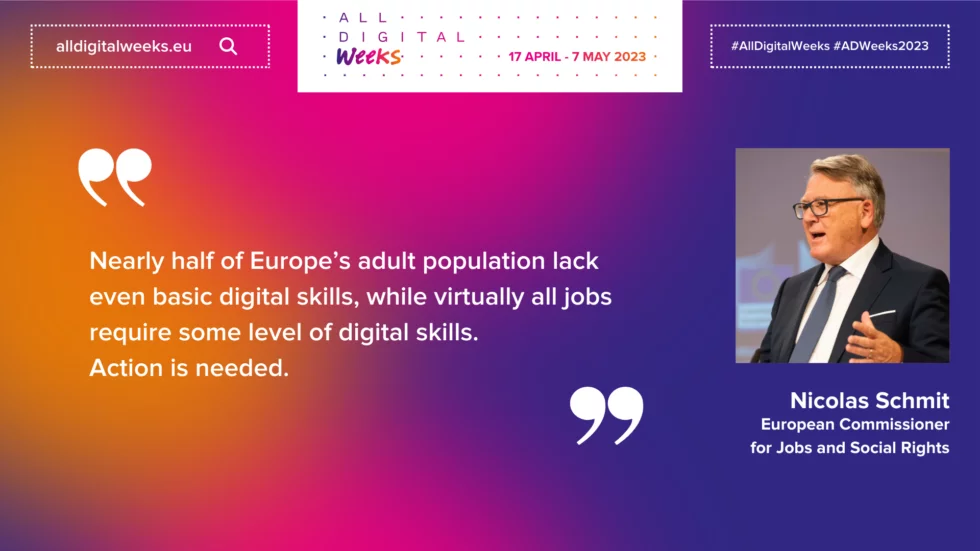
15 May ADWeeks 2023 International Launch Event Summary – 19 April 2023
15 May, 2023
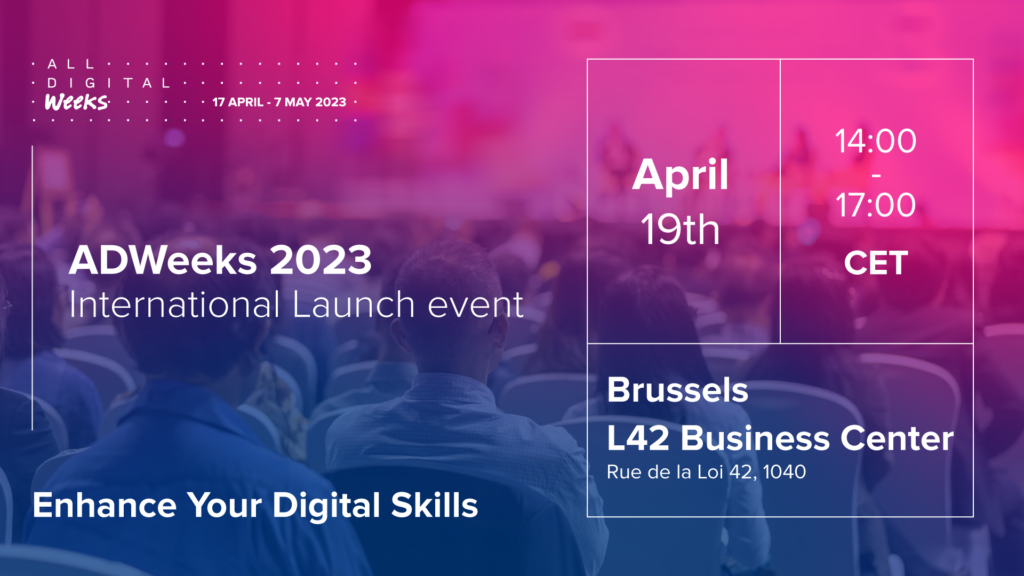
The ALL DIGITAL Weeks are the pan-European awareness raising campaign on digital skills for inclusion, empowerment, and employment, running from 17 April to 7 May 2023. Through the promotion of inclusive, accessible and quality digital competence development and digital education, the campaign aims to help Europeans learn and be inspired by the opportunities offered by the digital transformation.
This year, the campaign is focused on the European Year of Skills, promoting the need for all European citizens to enhance their digital skills for the digital transformation. Not only are digital competences key success factors for the employability of Europeans and labour market needs, they are also essential tools for the continued participation in society and democratic processes, addressing inequalities and discrimination, and safeguarding Social Rights. Digital education is the pathway to developing these competences, both in the sense of digitising education activities as well as in the sense of developing digital skills and competences.
The ALL DIGITAL Weeks 2023 were kicked off with an International Launch Event bringing together high-level speakers and experts on the key themes of the campaign. The international Launch event of the ALL DIGITAL Weeks campaign was held on 19th April at L42 in Brussels. The event was structured in three parts, consisting of keynote addresses, including Commissioner Schmit, a high-level policy panel and a showcase of ALL DIGITAL’s key initiatives on the development of digital competence.
The event was opened by Altheo Valentini, Chair of the ALL DIGITAL Board giving an introduction to the Weeks campaign and thanking partners, supporters, strategic partners, staff, and keynote speakers for their parts in realising this year’s edition of the Weeks. Altheo Valentini then introduced the first keynote address, delivered by Commissioner for Jobs and Social Rights Nicholas Schmit via a video link from Strasbourg.
In his speech, Commissioner Schmit thanked ALL DIGITAL for the invitation and expressed that he is happy to support a campaign like the ALL DIGITAL Weeks promoting digital skills, which now are requested everywhere. Most of the European people lack digital skills, either basic or advanced, yet over 90% require them, the Commissioner continued, and so action is needed. He highlighted the start of the European Year of Skills on 9th May, Europe Day, and stated that he believes that is crucial to have the EU in this campaign to sustain the education of digital skills. In his role as Commissioner he affirmed the requirement of investment in high-quality, resilient, and inclusive digital education and training, a key enabling factor for a successful digital transition.
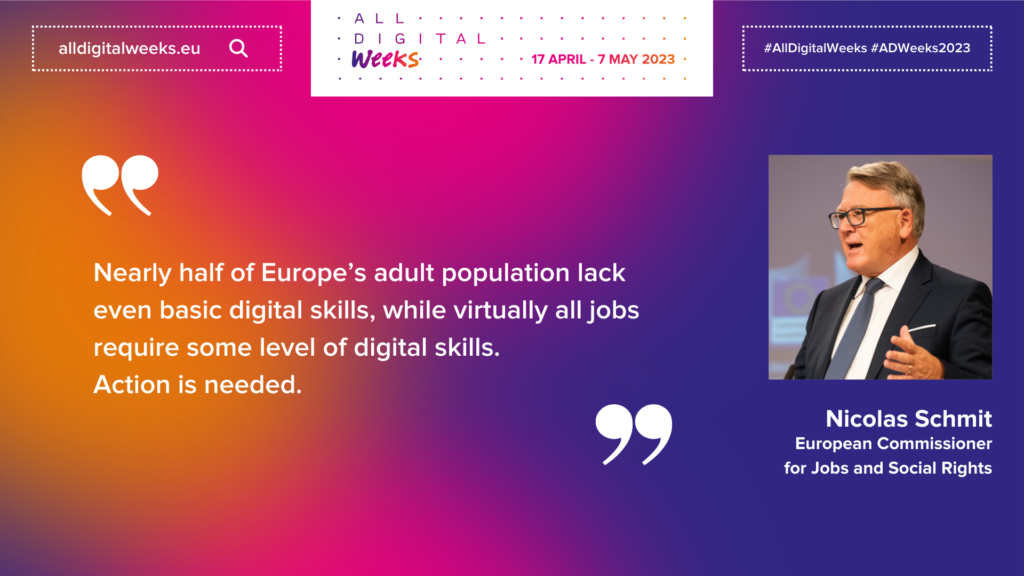
Furthermore, he announced the Commission is to launch a pilot of the European Digital Skills Certificate and several Member States had already joined the project. This will help people have recognised their digital skills by job providers, so the Commissioner. Furthermore, the Commissioner drew attention to cybersecurity as an important matter both for governments and the private sector, and the launch of the Commission’s cybersecurity package with the idea of closing gaps in this area, including an initiative for a European cybersecurity academy. Even if there’s no easy solution, the Commissioner elaborated, this package and the other measures adopted should create a new momentum for a digital skills revolution. The Commissioner concluded by emphasising that the ALL DIGITAL Weeks are a fantastic opportunity to promote the message of skilling and upskilling people, essentials for a more prosperous future.
The Commissioner also was available to receive questions from the audience, which was posed by Gina Ebner representing EAEA on the role of non-formal forms of education and training in these efforts towards skills development. The Commissioner’s response underlined the value of non- and informal training and his support of these flexible and often more practical offers enabling learners to also connect to jobs, making the link of potential benefits of a European certification scheme in this area.
One of the long-standing partners of the ALL DIGITAL Weeks campaign is Microsoft and Jeremy Rollison, working on Government Affairs at Microsoft, was the next keynote speaker at the launch event. He said, as the Commissioner before him, that the campaign was a more and more useful and inclusive event, especially in the education sector, and for this it needs all the support that Microsoft can give it. On cybersecurity, Rollison strongly believes that we need a workforce that is not only skilled but also vigilant, as nowadays this was an important matter, again referring to the Commissioner’s statements, which is due to the much wider spread of the digital world into every aspect of our society. To help doing this, Microsoft announced the expansion of their cybersecurity skills initiative to 13 countries in Europe, creating a program that fits the unique needs of these unique markets. Another aim to reach for Microsoft is to reduce the gender disparities in the IT sector. For Microsoft it is important to sustain campaigns like the AD Weeks because it emphasises the essential partnerships in private sectors, that help reaching these objectives.
Jeremy further explained that the upcoming challenge for Microsoft regarded AI, both to open doors and build solutions for the digital transition that is in progress now. Responding to a question from the audience on how digital competence centres and providers of the digital competence training can better interact with industry players, in particular tech companies, to really improve the offer that they can make for accessible and inclusive trainings, he said that the simple answer was that there should be a continuous dialogue because it’s all about teamwork, between big companies like Microsoft that have a big role in helping to develop digital skills and organisations like ALL DIGITAL and people benefitting from digital competence development.
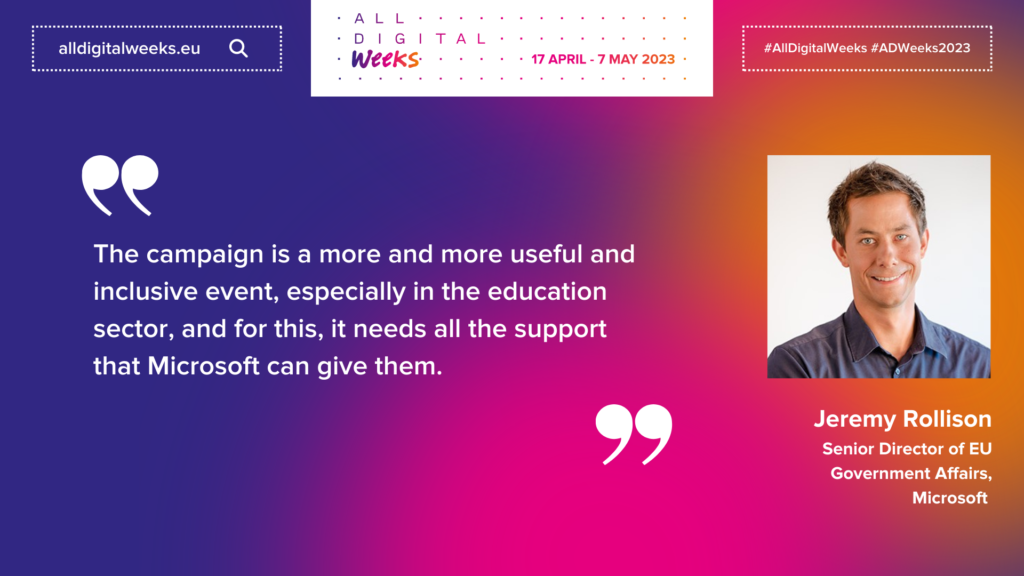
The third keynote address came from Brikena Xhomaqi, secretary general of the Lifelong Learning Platform (LLLP), a further strategic partner, who defined the ALL DIGITAL Weeks campaign as a milestone in the EU agenda of the digital field. According to Brikena, one of the greatest achievements of ALL DIGITAL’s work is highlighting the social dimension of digital education and training and she believes that everyone must continue fighting for that social dimension. Also, the Lifelong Learning Platform can count on the work of ALL DIGITAL and its member organisations. It is important to work together to face the challenges of the digital transition, linking to Jeremy Rollison’s intervention. She further stated that a lifelong learning approach is needed in order to equip people with basic digital skills and further give new learning opportunities to also new audiences. The pandemic period had also revealed how important it is to equip everyone with at least basic digital skills and to prepare them to use them critically. This was one of the challenges to work on together, according to Brikena. The Lifelong Learning Platform also has a clear idea of the teachers’ role, that now has changed and has a facilitation function, which means guiding individuals through a more joyful and dynamic learning experience. This then also bolsters a more democratic society as for example a lot of young people do not express their democratic power by voting, but they do it by using comments and feedback, and teachers should help everyone to participate in democratic societies, not leaving anyone behind. Speaking about the public and private sector, Brikena stated that they have a different level of speed, as they are serving the already qualified people who need further digital skills, but not necessarily those that are most in need. So, the aim is to not increase existing inequality, which can be achieved by working together with civil society organisations, and NGOs that are closer to people’s needs.
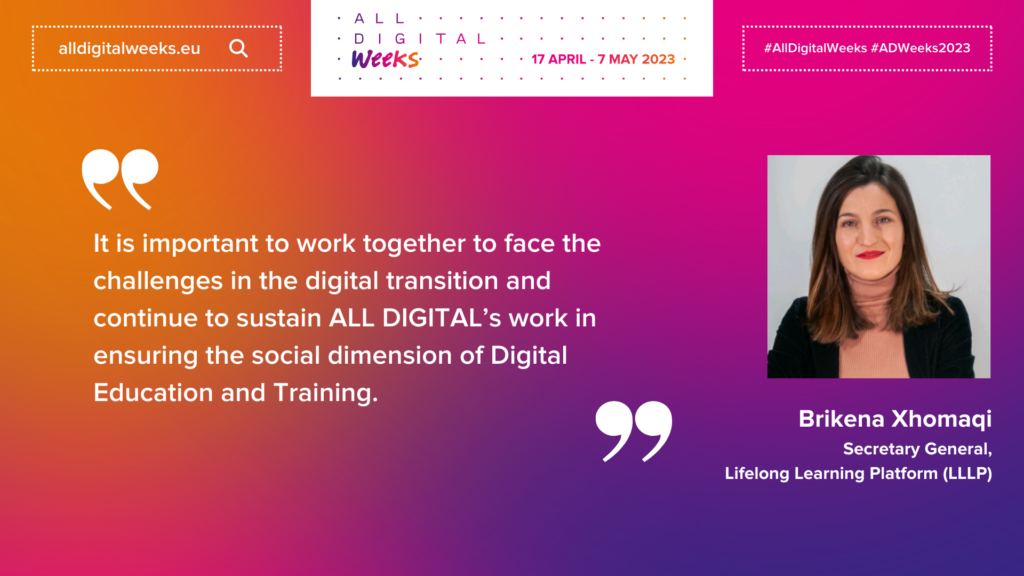
In summary, the three keynote speakers underlined that digital competences are not only necessary for employability, but also essentials for participation in the society and democratic processes, addressing inequality, discrimination, safeguarding social rights, and thus setting the stage for the second part of the event, namely the high-level expert panel discussion.
The panel discussion was moderated by Peter Palvolgyi, CEO of ALL DIGITAL, and began with a round of introductions by asking each panellist to complete the statement “Enhancing digital skills is important for all because…
- The first panellist was Georgi Dimitrov, Head of Unit for Digital Education at DG EAC of the European Commission, saying that it is fundamental to understand the type of technology and reality which is around us, in order to be able to master it and control it.
- For Sarah Loriato, policy officer at AGE platform, it is important because new technologies bring with them the risk of exclusion, and we must be sure to not leave anyone behind.
- According to Ana Carrero, Deputy Head of Unit for Vocational Training at DG EMPL of the European Commission it is important to participate in society for inclusion and to match labour market needs.
- Jakub Christoph, secretary general at CEPIS, said that is important for everyone but especially for the community of IT professionals.
- From the perspective of Achilles Kameas, professor at the Hellenic Open University and the DAIssy Research group, it is important for everyone because everyone is important, and everyone’s time is crucial, so we don’t have the luxury to wait to be late.
- Alessia Sebillo, Executive Director at DIESIS network, said that enhancing digital skills is important for all if we want to advance on sustainability and inclusivity, these are all matters that are all connected to each other.
- As the last panellist, Gina Ebner, Secretary General at EAEA, thought that it is important to have access in democracies.
Following the round of introductions, each panellist was asked a question towards their specific area of expertise, beginning again with Georgi Dimitrov, who was asked about the newly adopted Digital Education package.
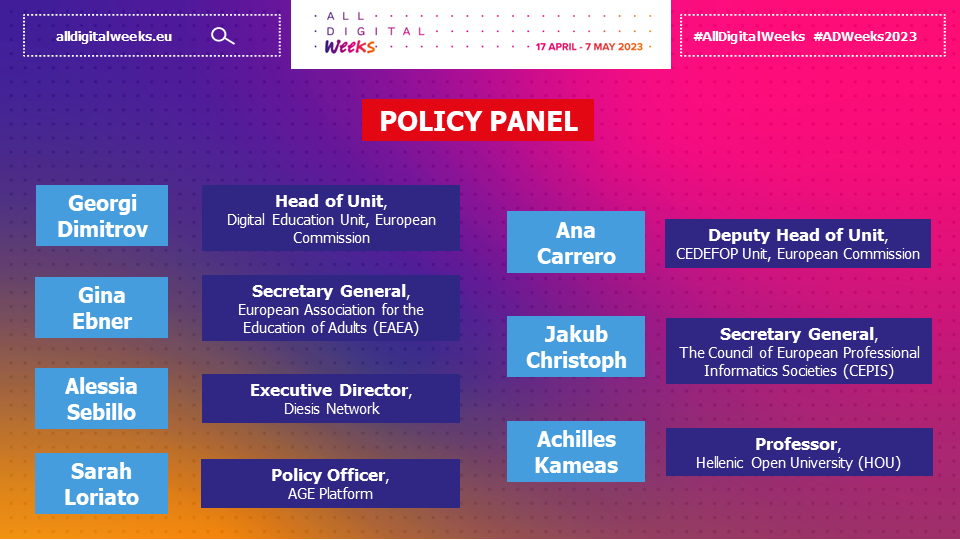
According to Georgi Dimitrov, Council Recommendations like the ones just adopted are technical documents, and thus he chose to start with the foundations. One of the two Council Recommendations is called “Key enabling factors”, because in order to have any kind of digital skills you need to have the ecosystem around you and you need to do practical exercises, rather than a lot of theory. You need to have the schools and the teachers that are able to teach you digital skills, so it’s all about the infrastructure, access to devices and connectivity (less than 20% of schools have gigabit access to connectivity), Georgi further explained. For this reason, the Commission proposed some measures to the Member States in the Recommendation, in order to make this ecosystem work first of all. Another important point is to work effectively together, with the schools for example, on different policy areas, Georgi continued. The Commission recommends to Member States to create such a dialogue, and the ALL DIGITAL Weeks is a good example of dialogue on the issue of enhancing digital skills. Georgi also stated that the introduction of high-quality informatics education on a more widespread basis than today was a very important measure that the Commission is proposing to Member States to consider, because it is a fundamental science, as well as establishing a systematic overview on how each of the economy sectors can perhaps more effectively address the needs for digital skills.
The next question was put to Ana Carrero about the European Year of Skills starting 9 May, and the hopes and visions of the Commission for the campaign. Ana explained that the Year of Skills comes in the specific context of continuing to push forward the green and digital transitions, but they are also facing a lot of challenges in these fields. A key concern is that adults do not participate in training very often and the aim is to reach the 60% of adults participating in training every year (now 37%). Another challenge regards the progressively shrinking population inspiring efforts to give visibility and change the mindset on skills, for inclusion and the labour market. In this context the European Year of skills was proposed and will have four broad objectives, laid out by Ana: 1. Investment to be more effective and inclusive. 2. Skills should be more relevant according to labour market needs and in this respect it’s very important to work together. 3. To match people’s aspirations and skills sets with labour market needs particularly for the green and digital transitions and the recovery. 4. Attract people from more countries giving them the opportunity to learn and provide them more opportunities for recognition of their qualifications. In a further call to action, Ana called on Member States, National Coordinators, stakeholders, and companies to work with the Commission to make the Year of Skills a success. The Commission will organize events, to discuss and present tools and they hope that also other partners can do the same. The first event will be the Skills Festival on 9th May, Ana announced.
Giving the floor to Achilles Kameas, the discussion returns to digital skills for equity, diversity, and inclusion, the title of the panel, and why it is important to take into account these aspects. Achilles stated that equality was an attitude, while diversity was a fact, something that existed, and inclusion was the process that starts from diversity to achieve equality. Nowadays, the lack of digital skills inevitably leads to exclusion, different types that can appear in different ways. Achilles also laid out what we can do to prevent this and that, as many of the speakers said, synergies and education was also a main tool. The role of ALL DIGITAL is important in these issues of equality and diversity, and the Manifesto (ALL DIGITAL Manifesto for Enhancing Digital Competences in Europe) is clear on this. There is a need, Achilles continued, to educate the people who might be at the risk of exclusion, but they need other types of skills also, not only digital, but many sets of skills which have to be developed together. There also is a need to empower educators, who are the actors of change, and we need to give people a model to follow, according to Achilles. He called for working with education providers and the environment in general (business sectors, job providers). Achilles pointed to the many instruments ALL DIGITAL has to achieve these objectives and ALL DIGITAL Weeks is one of them, as are the ALL DIGITAL Summit, the DigComp Hub, and the ALL DIGITAL Academy, the broader umbrella that ALL DIGITAL is building as a service to its members to enhance digital competence.
Sarah Loriato’s intervention was about the situation of older people when it comes to digital competences and how these can impact their active inclusion and civic participation. During the pandemic, we all benefitted from digital acceleration, she said, with the possibility to stay in contact with our families, however also a lot of people stayed offline and faced isolation. Older people are overrepresented in this section, mainly due to an outdated vision of the life course approach, Sarah explained, and that we still tend to think in categories of early years are for education and adulthood is for working, but as we have more flexibility nowadays, we need to adapt this to education also on digital skills. She emphasised that it is wrong to think that older people don’t care about digitalisation, and that it is not interesting for them, because they are at the end of their carrier or because they don’t have anything to contribute in this field or in the labour market. Contrary to these false assumptions, Sarah outlined that if pensioners want to be part of the labour market and still be active, having digital skills is important also for them. There is a need to teach them digital skills also to give them the possibility of access to goods and services. Many public and banking services are moving online and now could be difficult to access if you don’t have basic digital skills. It is true, Sarah affirmed, this also is valid to allow all people to participate in political and cultural life. Another level for which it is important to provide digital skills to older people is to give them autonomy and independence, to use smartphones, communicate without the mandatory need of someone of the family.
Turning to Alessia Sebillo, who was asked to answer the question on how social enterprises, represented by the DIESIS network, benefit from the widespread development of basic and advanced digital skills. Alessia elaborated that the three fundamental aspects of these enterprises are (1) to have a social and environmental impact, (2) to reinvest the profit (not for the management but for the community) and lastly (3) the democratic governance. Alessia affirmed that there is a connection between these aspects and the spread of digital skills, and that social enterprises must still learn a lot on how to improve digital skills in order to improve the efficiency, productivity, communication and collaboration. They are now working on a blueprint for social economy and proximity to understand what these specific needs are, and what transversal skills are essential to go through the changes we are navigating.
The IT professionals have a very important role to play in Europe in general and not just in the area of digital skills. Jakub Christoph was asked what is needed to meet the targets that the European Union has set. Jakub thinks that the common view of IT professionals should change, and pointed out that there are many misconceptions. Despite the stronger presence of AI systems in society, which is becoming more and more precise, we still need the IT professionals, especially those called generically ‘bridge builders’, those professionals who are linking the development sides of the IT industry with the operations and needs of organisations. He continued by saying that one misconception to fight is how to promote the IT professionals’ jobs of the future. This connects to a second misbelief, which is the idea that all IT professionals go through university and every one of them follows the same pathway, which is wrong because nowadays we have a great variety of courses, and tools that give these professionals a different background and knowledge. The third aspect to underline, so Jakub, is that statistically these IT professionals are male, but there is an opportunity to increase the number of professionals helping the groups that are less represented to enter in this field. While in the big tech company there generally was gender equality among the number of employees, there’s not the same equity in the IT areas of the same companies. Jakub concluded by underlining that anyone can become an IT professional.
As the final speaker, Gina Ebner was asked to elaborate on the roles of formal and non-formal education in digital competence development, and to highlight the lifelong learning perspective. For her and her organisation EAEA it is important to reach people who normally don’t learn, who are excluded, she explained, and outreach is essential. For EAEA, it really is an issue of empowering people to take control of their lives and what’s happening around them. Trying to go to the people who need learning is the key; the other important part is to have a more inclusive democracy, Gina explained.
After the conclusion of the panel discussion and a coffee break, the audience returned to the plenary to hear presentations on three of ALL DIGITAL’s key initiatives on digital competence development. The ALL DIGITAL Academy was previously mentioned by Achilles Kameas, and presented in more detail by ALL DIGITAL’s Afonso Araujo and Theodor Panagiotakopoulos from the Hellenic Open University. The initiative seeks to establish a learning and knowledge sharing platform with a focus on advanced and innovative technologies, for example artificial intelligence, and is following a train-the-trainers approach. Secondly, the DigCompHub was presented by Peter Palvolgyi and Stefano Kluzer, and aims to expand on the work of the existing Community of Practice on the design, validation and promotion of the DigComp framework across Europe and beyond. Lastly, the on-going feasibility study for a European Digital Skills Certificate, mentioned by Commissioner Schmit in his speech, was presented by Norman Röhner from ALL DIGITAL, giving an update on the large-scale consultation activities concluded, and the upcoming pilots.
The event concluded with an outline of the events and activities of the ALL DIGITAL Weeks 2023 campaign



